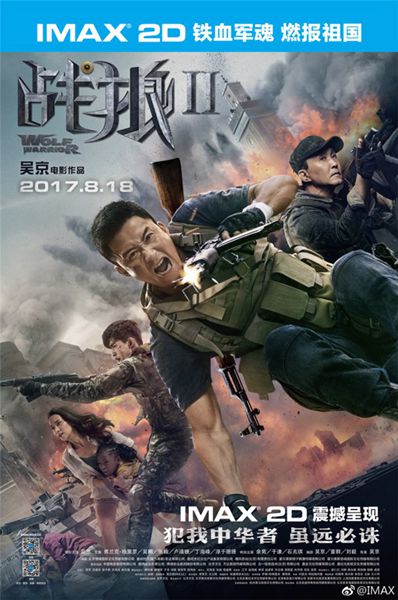Action movie star comes of age in Wolf Warrior
- By Ni Tao
 0 Comment(s)
0 Comment(s) Print
Print E-mail Shanghai Daily, August 14, 2017
E-mail Shanghai Daily, August 14, 2017
|
|
|
An IMAX poster of "Wolf Warrior 2." The IMAX version of the film will hit Chinese theaters on Aug. 18, 2017. [Photo/ China.org.cn] |
I went to see the much-hyped action movie Wolf Warrior 2 the other day.
The movie, directed by and starring Chinese filmmaker and martial artist Wu Jing, has been the talk of the town since its release on July 27.
Already the highest-grossing film ever to be shown on the mainland, Wolf Warrior 2 has earned about 3.5 billion yuan (US$5.25 billion) as of last Wednesday at the box office.
As an ordinary movie-goer, I was more fixated on the film per se than the box office takings or the implications it has for the Chinese film market.
A sequel to Wolf Warrior that premiered in 2015, Wolf Warrior 2 has an even more gripping storyline. The plot is centered on an ex-PLA Special Forces soldier, played to perfection by Wu, who almost single-handedly led Chinese expats and other refugees on an odyssey fleeing a war-torn and plagued-ravaged country.
The massive use of state-of-the-art weapons, the bloody combat scenes, the close-quarter fighting all gave the viewers an adrenaline rush. As I sat in a packed theater, the gunfire, rumbling of tanks and explosion of shells sent my heart racing.
The movie is thinly veiled in its attempt to instill patriotic ardor and pride in the mainly Chinese audience as part of its scenes is clearly inspired by real events.
We still recall how China managed to evacuate, with stunning efficiency, tens of thousands of its nationals on the cusp of civil wars in Libya and certain other countries a few years ago.
In a certain way, Wolf Warrior 2 is a paean to the way China committed itself to rescuing its nationals stranded in hot spots abroad.
The patriotic overtone is a major reason the film is highly commended. But what I find more interesting about it is that it has popularized a new genre in Chinese cinema: military-themed movies.
In recent years, Chinese cinema and TV have been invaded, and almost colonized, by a plethora of commercial potboilers about urban romance, infidelity, material desire and not much else.
The result is that Chinese cinematic works are becoming bland and kitschy; worse, they strengthen stereotypes about the showbiz industry that it produces nothing but wimps.
Indeed, a lot of criticisms have been heaped on the cult of so-called xiao xian rou, literally "little fresh meat," meaning good-looking teenage idols that many women swoon over.
The good times for xiao xian rou — effeminate, camp and appealing to some women's maternal instincts — seem to be coming to an end as the bored audience desires something new, something more masculine, and something catering to the mentality of a rising nation.
In a word, we need our tough guys, we need our Sylvester Stallone or Jason Statham. At this point Wu came along with his Wolf Warrior series and naturally made a big splash.
The film is not without critics, though. For example, the combat scenes showing Wu and a few comrades pulling through relatively unscathed from clashes with marauding rebel troops and well-trained mercenaries are indeed exaggerated, even surreal. And the accusation that the film promotes Rambo-like individual heroism is not entirely unreasonable.
Artistic merit
But these criticisms may pale in comparison to its overall artistic merit. Although I consider myself an art-house film buff, and have been quite unfamiliar with military-themed works released in recent years, I have no doubt that the Wolf Warriors series has a good chance of entering the hall of fame shared by the likes of the First Blood series or the Expendables trio.
In fact, sections of Wolf Warrior 2 did remind me of thrillers set in African war zones, such as Bruce Willis's Tears of the Sun (2003) or the Blood Diamond (2005). And the tank fight toward the end was obviously inspired by Brad Pitt's performance in the Fury (2014).
I don't know to what extent Wu took cues from all the blockbusters that went before, but Wolf Warrior 2, combing elements old and new, foreign and domestic, is a success in its own right.
While many are placing bets on whether the box office takings of Wolf Warrior 2 could top 4 billion yuan, a less-often asked question is what its immense success entails.
Anyone following Wu's cinematic career for some time now can tell that he is a stranger to the current surge to super-stardom.
He was widely tipped to replace Jet Li as the next kung fu emperor but somehow failed to come up with works that met critics' expectations — until the Wolf Warriors series appeared.
But at what cost? He reportedly reinvented himself by staying and training with a real PLA Special Forces unit for 18 months. That spell set the stage for the Wolf Warrior series. The many grueling days of hard training have paid off.
How many of the junior actors today would be willing to sacrifice their unearned comfort for a chance to be chastened through the fire and flames?
No pain no gain.







Go to Forum >>0 Comment(s)